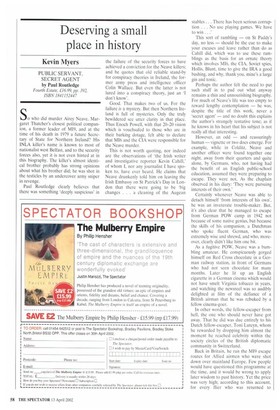Deserving a small place in history
Kevin Myers
PUBLIC SERVANT, SECRET AGENT by Paul Routledge Fourth Estate, £16.99, pp. 392, ISBN 1841152447 So who did murder Airey Neave, Margaret Thatcher's closest political companion, a former leader of MI9, and at the time of his death in 1979 a future Secretary of State for Northern Ireland? His INLA killer's name is known to most of nationalist west Belfast, and to the security forces also, yet it is not even hinted at in this biography. The killer's almost identical brother probably has strong opinions about what his brother did; he was shot in the testicles by an undercover army sniper in revenge.
Paul Routledge clearly believes that there was something 'deeply suspicious' in the failure of the security forces to have achieved a conviction for the Neave killers; and he quotes that old reliable stand-by for conspiracy theories in Ireland, the former army press and intelligence officer Colin Wallace. But even the latter is not lured into a conspiracy theory, just an 'I don't know'.
Good. That makes two of us. For the failure is a mystery. But then Northern Ireland is full of mysteries. Only the truly bewildered see utter clarity in that place. Thus Enoch Powell, with that 20-20 vision which is vouchsafed to those who are in their barking dotage, felt able to declare that MI6 and the CIA were responsible for the Neave murder.
This is not worth quoting, nor indeed are the observations of 'the Irish writer and investigative reporter Kevin Cahill,' of whom I, nor any journalist I have spoken to, have ever heard. He claims that Neave drunkenly told him on leaving the Irish Embassy on St Patrick's Day in London that there were going to be 'big changes . . . a cleaning of the Augean stables .. . There has been serious corruption . . . No use playing games. We have to win ...'
This sort of rambling — on St Paddy's day, no less — should be the cue to make your excuses and leave rather than do as Cahill did, which was to use these ramblings as the basis for an ornate theory which involves MI6, the CIA, Soviet spies, Hollis, Blunt, time to give the IRA a good bashing, and why, thank you, mine's a large gin and tonic.
Perhaps the author felt the need to put such stuff in to pad out what anyway remains a thin and unnourishing biography. For much of Neave's life was too empty to reward lengthy contemplation — he was, despite the title of this work, never a 'secret agent' — and no doubt this explains the author's strangely tentative tone; as if he knows in his heart that his subject is not really all that interesting.
However, an odd — and reassuringly human — vignette or two does emerge. For example, while in Colditz, Neave and another officer were found together one night, away from their quarters and quite alone, by Germans, who, not having had the benefit of an English public-school education, assumed they were preparing to escape. They were not. As the chaplain observed in his diary: 'They were pursuing interests of their own.'
Certainly whenever Neave was able to detach himself 'from interests of his own', he was an inveterate trouble-maker. But, it's also clear that he managed to escape from German POW camp in 1942 not because of some native genius, but because the skills of his companion, a Dutchman who spoke fluent German, who was extremely wise and shrewd, and who, moreover, clearly didn't like him one bit.
As a fugitive POW, Neave was a bumbling amateur. He conspicuously gorged himself on Red Cross chocolate in a German railway station, in front of Germans who had not seen chocolate for many months. Later he lit up an English cigarette in a German cinema which would not have smelt Virginia tobacco in years, and watching the newsreel was so audibly delighted at film of the defiance of a British airman that he was rebuked by a fellow cinema-goer.
In other words, the fellow-escaper from hell, the one who should never have got away. That he did was due entirely to his Dutch fellow-escaper. Toni Luteyn, whom he rewarded by dropping him almost the moment he reached celebrity within the society circles of the British diplomatic community in Switzerland.
Back in Britain, he ran the MI9 escape routes for Allied airmen who were shot down over mainland Europe. Few people would have questioned this programme at the time, and it would be wrong to apply later wisdom to past history. Yet the price was very high; according to this account, for every flier who was returned to Britain, at least one mainland European helper was executed.
Aire), Neave was not responsible for this, for he could not have known of such murderous arithmetic. As it was, he was much disturbed by the deaths of innocents killed because of his operations, and to his credit he was passionately concerned for the welfare of his agents in the field.
Anyway, Neave's real significance, such as it is, lies elsewhere. Aside from being a man who inspired tremendous personal affection, he was the architect of the most important political victory in western European history in the final quarter of the 20th century — the election of Margaret Thatcher as Tory leader. But long before that, as an obdurate rock against communism, he formed a small part of the great reef upon which communism was finally to founder. And for that duty against totalitarianism, unwaveringly done when fashion dictated otherwise, he deserves a place in history. A small place.



















































































 Previous page
Previous page